‘I had to convince Ricky to keep in the David Brent dance’: An oral history of The Office
As the mockumentary that changed the course of comedy turns 20, Simon Bland speaks to co-creator Stephen Merchant, and some of the show’s stars, to reflect on the creation of a modern comedy classic
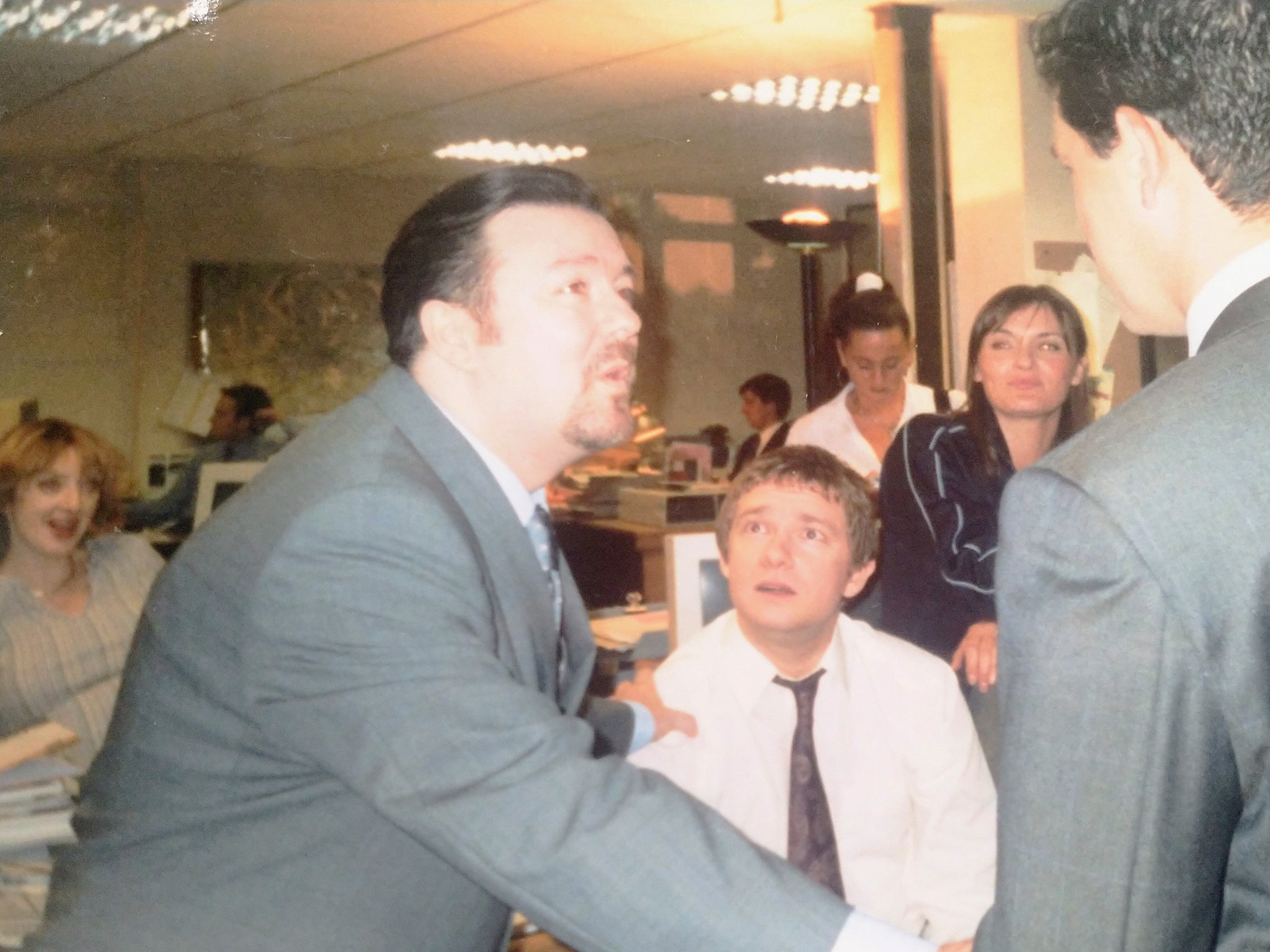
Your support helps us to tell the story
From reproductive rights to climate change to Big Tech, The Independent is on the ground when the story is developing. Whether it's investigating the financials of Elon Musk's pro-Trump PAC or producing our latest documentary, 'The A Word', which shines a light on the American women fighting for reproductive rights, we know how important it is to parse out the facts from the messaging.
At such a critical moment in US history, we need reporters on the ground. Your donation allows us to keep sending journalists to speak to both sides of the story.
The Independent is trusted by Americans across the entire political spectrum. And unlike many other quality news outlets, we choose not to lock Americans out of our reporting and analysis with paywalls. We believe quality journalism should be available to everyone, paid for by those who can afford it.
Your support makes all the difference.The Office is a comedy cornerstone, not just in the UK but across the world. When Stephen Merchant and Ricky Gervais created their hopelessly oblivious boss from hell, David Brent, they forever changed what audiences expected from sitcoms. Soon, every country had their own Brent-a-like – from Chile’s Manuel Cerda to America’s Michael Scott – while future hits such as Parks and Recreation adopted the show’s fly-on-the-wall mockumentary style, riding it to critical acclaim.
Combining too-awkward-to-look moments with genuine heart, The Office defied expectations – and terrible test-screen responses – to become one of TV’s most beloved comedies. Its iconic characters, lines and looks to the camera still loom large in the public psyche. As the show turns 20 today, writer, director and co-creator Stephen Merchant and stars Ewan Mackintosh, Stirling Gallacher, Joel Beckett and Rachel Isaac reflect on the creation of a modern comedy classic. Get the guitar...
Ricky Gervais and Stephen Merchant create a terrible boss character while working on a comedy short and soon realise they’ve hit comedy gold. Pre-production on ‘The Office’ begins...
Stephen Merchant: Ricky had one or two observations about the types of people you found in offices, and they got fleshed out by us through improv and a 20-minute film that we made. It wasn’t some big plan to do a takedown of documentaries, but when we did the show, we realised we’d hit on something quite zeitgeisty. At the time, there were lots of reality shows which were taking regular Joes and making them famous. I remember talking to Ricky about Big Brother and Driving School. What was interesting was the gap in how people wanted to present themselves and how they were really coming across. David Brent presenting himself one way and coming across in another was tantalising.
Joel Beckett (Dawn’s boyfriend Lee): I was told to stay in character until my audition was over. It came to an end and Ricky asked, “What are you doing this evening?” I was still doing my Lee voice and said, “I’m going to buy a car.” I reeled off details of this pretty awful car and he said, “Oh, sounds nice…” I turned to him and said, “Are you taking the piss?” He started backtracking and I started getting a bit more aggressive. Eventually, I asked if we were done. He said, “Yeah,” and I said, “Good! Hi, I’m Joel. Nice to meet you.” He was like, “Jesus Christ, I thought you were going to hit me.”
Ewan Mackintosh (Big Keith): I didn’t have a character when we started; Keith sort of developed through the first series. In the original script, some of the lines just said “Office Worker”, but Ricky and Steve said they didn’t want to cast extras because they might have to suddenly give someone a line.
SM: It shows our naivety – but Ricky and I thought, “We’re never going to find these people from the acting world – we’re going to have to use real people because nobody is going to be authentic or naturalistic enough.” Of course, what you only learn later is that real people off the street are generally quite terrible and you do need actors – there’s a reason they’re actors.
Stirling Gallacher (David’s boss Jennifer): With Jennifer, it was all about how she looked and what level of posh she was. At the audition, Ricky wanted it to read as naturally as possible. Up until that point, I’d been doing a lot of theatre so I didn’t quite understand the style – or what he wanted me not to do.
SM: It’s a testament to Ricky that he inhabited [David Brent] so fully. That made the process of writing him easier because we could improvise with him in character. Jimmy Carr, who’s from Slough, drove us around Slough and we looked at where he might have worked and lived and got a sense of him. The failed musician and all those other things just came through discussion and talking about people we knew, had worked with and friends of our parents. We were just endlessly chatting and establishing his biography.
Rachel Isaac (office flirt Trudy): Ricky used to say my character was the only one who challenges Brent to his face. All the other characters moan about him behind his back but they kind of go along with him in front of him, whereas Trudy says, “What do you mean?” I query him quite a lot.
EM: One of the first things I did was a scene where Ricky was introducing the new guy to everyone and I basically just stared him down as he was introducing him. Ricky couldn’t stop laughing and I think at that point he thought, “This guy’s a great foil.”
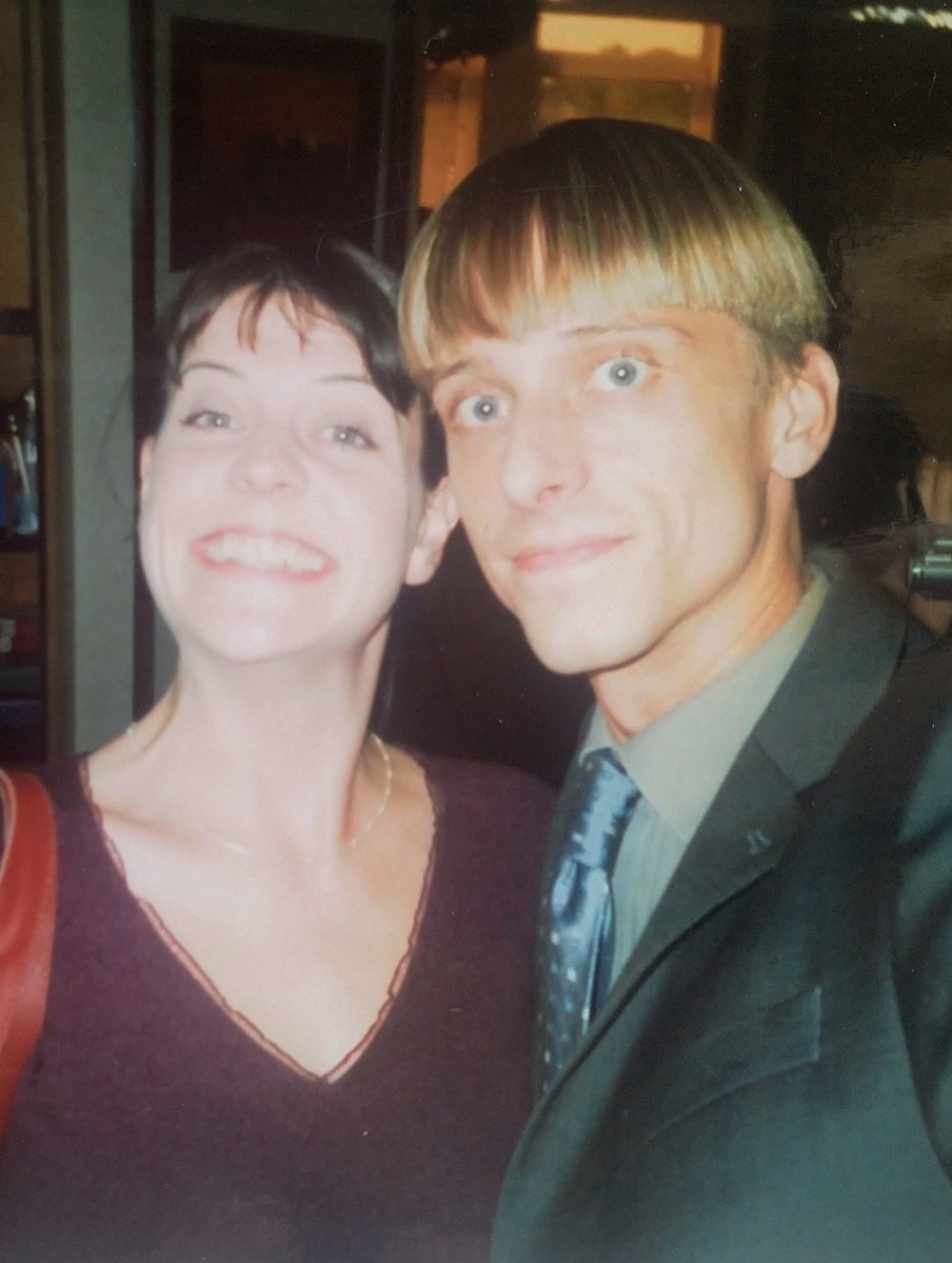
SG: I could never quite justify why Jennifer liked or tolerated Brent. I had to make up a backstory. I don’t understand why she wouldn’t have noticed when he was looking up her skirt. I did enjoy being one of the few characters he was afraid of though – and keeping a straight face was always tricky because I’m a cheap date for a cheap gag, and there were many. Ricky is so naughty and playful; he tries to get you right before they shout action. It was difficult.
EM: I took a course at a market research call centre before The Office, and there were a couple of people there who were very different outside of work when they went to the pub. I could literally see them leave themselves on the threshold as they went in. Keith was similar – he was this guy who hated his work and was probably very different away from the office but you never got to see that side of him.
SM: Our early version of Gareth was a lot more macho and a bigger, more muscular guy – then Mackenzie [Crook who played Gareth] came in and was just so the opposite of that. It was even funnier that he thought he was this tough territorial army guy when he looked like, as Ricky said, “a little broken bird”. That was joyous. Martin [Freeman who played Tim] came in to audition for Gareth as well and on the way out I said, ‘Would you mind reading for this other character?” He did Tim and was just so charming and effortlessly endearing that he was a shoo-in and similarly for Lucy [Davis who played Dawn].
JB: I’ll always remember the read-through. Usually it’s just the actors, heads down, reading the script – but as soon as it started, you could see people’s heads coming up. They were involved and connected with the other actors. You could see the laughter coming in and that sense of energy happening right in front of you. I remember looking around and seeing Martin, Lucy and Mackenzie just going at it and I thought, “This is quite special.”
With Brent’s workforce assembled, shooting on their faux-documentary series began in a disused office block in Teddington, far from the watchful eye of BBC head honchos...
EM: I didn’t go to acting school. I came up doing sketch comedy, so I always say my acting school was doing The Office. Every day I was learning from the best in the business. I’d look at how Martin, Mackenzie, Lucy or Ricky worked, learn from those guys and try to emulate that. It was like a massive eight-week-long drama course for me in a weird way.
SG: There was a really strong ensemble feel to it, right down to everybody in the office – even those in the background. They were all actors, they weren’t extras. I think that really shows in the detail going on in the background and some of the performances that the people who weren’t even speaking we’re giving. It’s beautiful.
RI: It was filmed by a documentary crew to give it that genuine documentary feel. They didn’t use a drama crew pretending to be a documentary crew – they genuinely were a documentary crew apart from the director of photography and first assistant director.
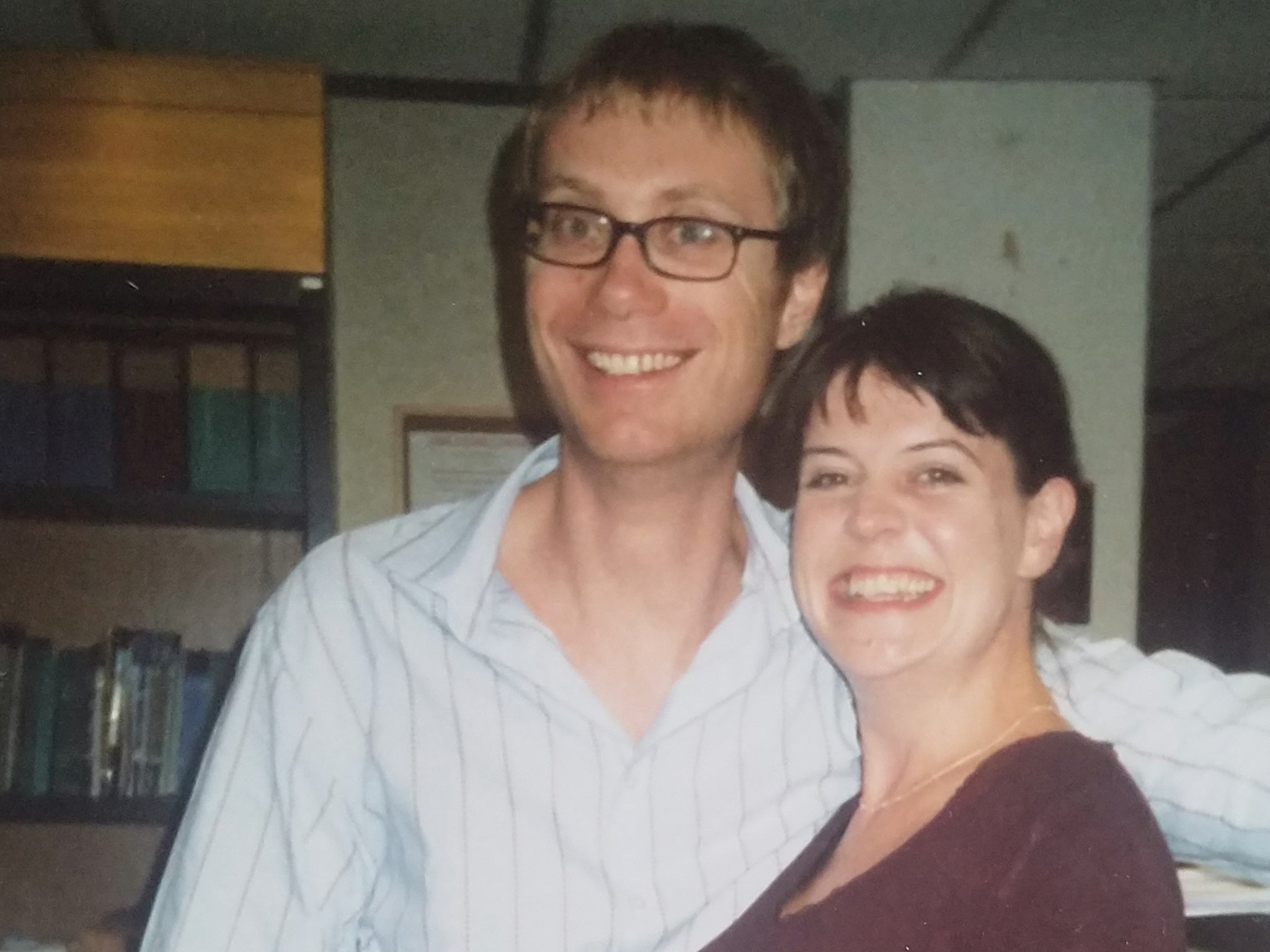
SM: We became very obsessed with it feeling like a real documentary and as authentic as possible. The idea that someone could switch on the TV and think it was a real documentary was a great ambition of ours. We felt that if we bent the rules too much, the whole thing would fall apart and without the realism it wouldn’t work because it’d start to feel too sitcom-y. The official pilot that we shot for the BBC was more sitcom-y and Ricky and I panicked and asked if we could reshoot it for the series – which we did. It felt a little too plot driven. There were pratfalls and things that didn’t feel right. It was important for us to get back to the feeling that this had been cobbled together by the BBC from hours and hours of footage.
RI: We were having a laugh but we were also working. We were doing scenes over and over and seeing if we could find anything extra in them. If you wanted to do another take because you felt like you had an idea, there was room to do that. It was so good because we had time to find the extra special moments all the way through every episode.
EM: I’m envious of myself now of being on that set because it was all so easy and relaxed. There was no pressure at all. The BBC’s head of comedy maybe visited us twice and there was less social media so it did feel like we were on our own. None of our computers in the first series were even hooked up to the internet. All we could do was sit and play solitaire on them.
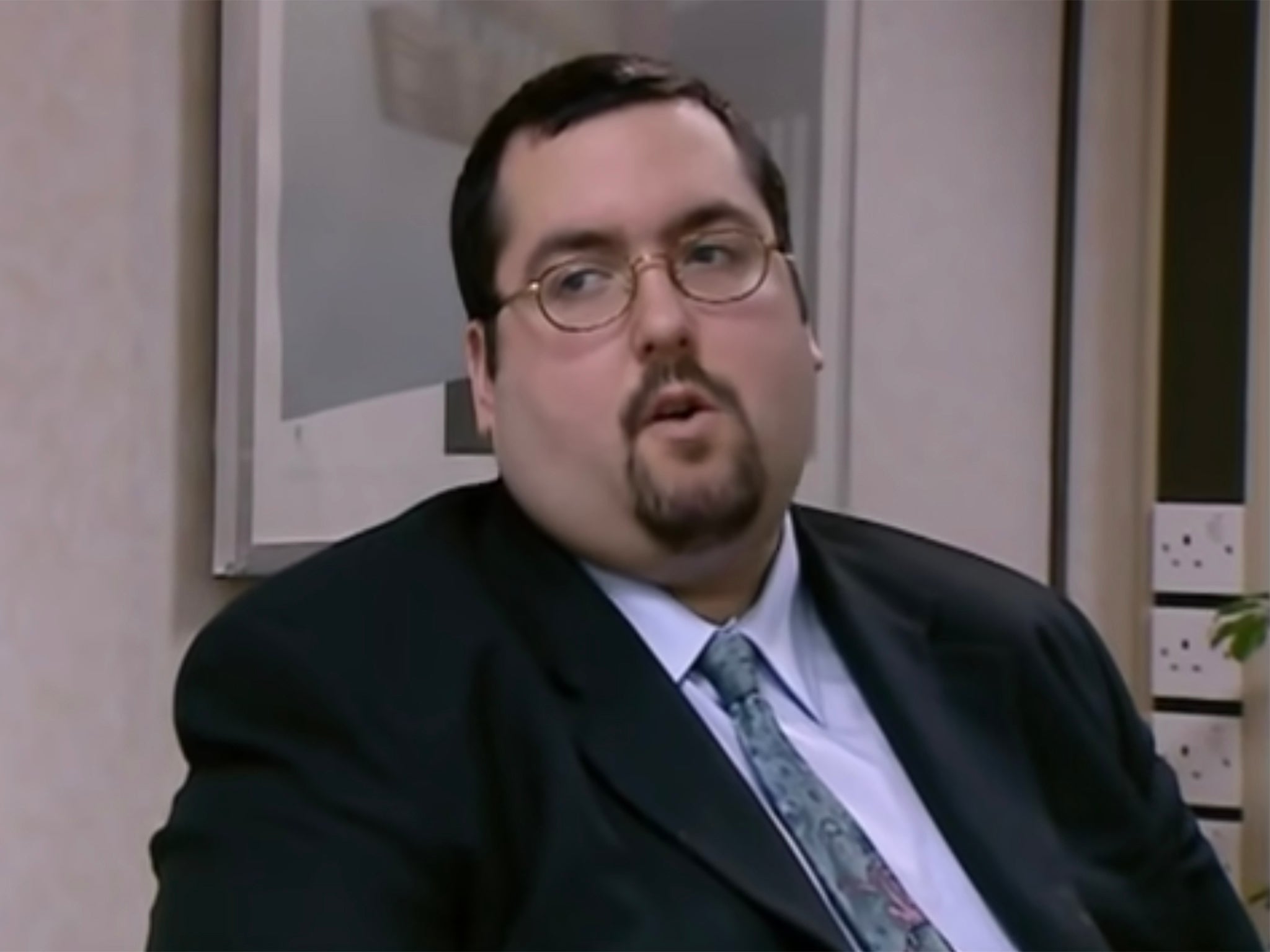
It wasn’t long before this low-expectation show started crafting some hilarious cringe-comedy moments – alongside scenes of unexpected heart and depth...
SM: All of my favourite shows had a will-they-won’t-they romance so I was very adamant that we should put that in. I think Ricky was a little more resistant to it initially because he was worried it’d be mawkish or sentimental. Actually, the fake documentary style lent itself to that even better than we ever could’ve hoped. Because these characters are being observed all the time by cameras, it means they can’t go off in a corner and snog. Suddenly it made everything like a simmering Victorian melodrama where the brush of a hand against another hand was charged with electricity. Once we realised that, it was really freeing.
We were having a laugh but we were also working
JB: I remember wishing Lee had more dialogue but as we went on I totally understood why he didn’t. Everybody says Lee’s an arsehole and a nasty piece of work and if you look at it, he’s not – he’s just a bloke. There’s such a want for Dawn and Tim to get together that the dislike for Lee is formed in the viewer’s head. If he had loads of dialogue, it wouldn’t have worked. There’s a scene where I push Tim up against a cupboard and grab him by the throat. Originally there was loads of dialogue with that, and I turned to Ricky and said, “Can I just do it without any dialogue?” It showed me that with that character, less is more and it was up to the audience to make their own decision. The more silent presence he had, the better.
EM: The scotch egg scenes were something that were planned quite late on, maybe even on the day. The props guy nipped out to Sainsbury’s to get some and it’s a good job he bought a lot because I went through them. We were reusing them by the end, turning them around to hide the bites because we did so many takes. The funny thing is, they don’t really have scotch eggs in America, so when the show started to do well there, Americans were like, “I love that guy with the apple.” I was like: “That’s not an apple, my friend…”
RI: Trudy is a bit of a party girl and full of fun. We improved around drunk acting which is quite difficult to do and you can look like an idiot doing – so I was doing very subtle drunk acting. Ricky and Steve were like, “Can you be a bit more drunk?” until we were improv-ing four, five, six glasses of wine. I eventually said, “OK, I’ll do seven but if this starts to look terrible, remember we can always do four glasses.”
SG: [Shooting David’s redundancy scene where he’s dressed like an emu] was a very delicate process, because he was quite teary and it was sad. I went along with it and I was genuinely sad for him and he played it beautifully – then he stood up and you really had to hold onto yourself...
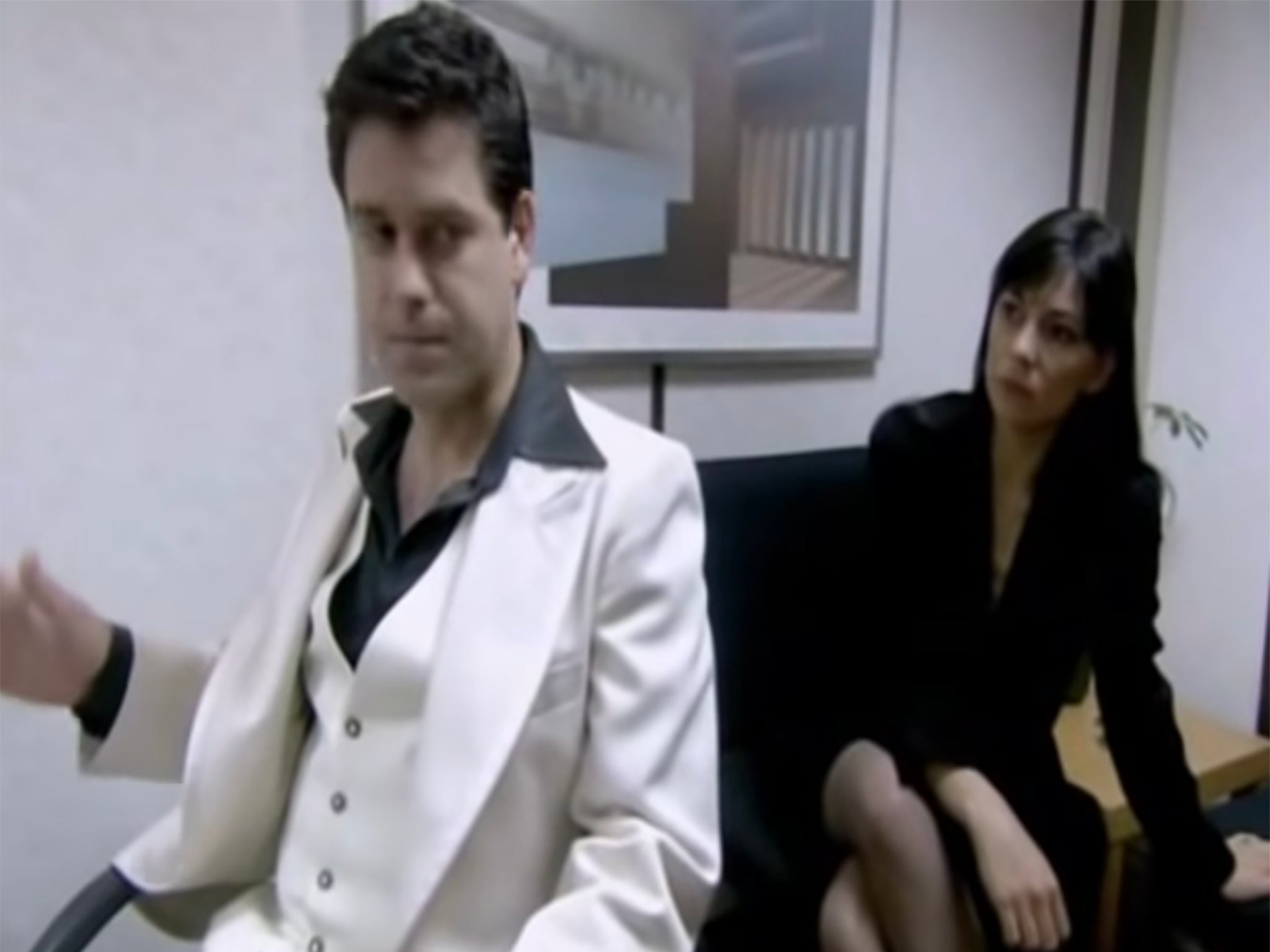
SM: I remember there was a joke about Gareth talking about having some kind of sex swing in his house, which we decided was too silly or didn’t feel right. In fact, Ricky didn’t want us to include the David Brent dance. He felt that was too much and I had to lobby to keep it in.
RI: None of us knew what the dance would look like. Stephen hadn’t seen it. Nobody’d seen it. There was no practice – it was a proper on-camera first take. I remember us all going, “Oh God, what’s this going to be like?” I must admit, when it started, I actually couldn’t keep a straight face – so I’m less in that scene than I should’ve been because there was a lot of laughing going on.
SM: Ricky was happy to shoot the dance, but in the editing room he thought it was too broad. I was just saying, “It’s so funny and the sincerity in which he’s approaching it is so good that we have to keep it in.” There was a lot of discussion about that and obviously I won, so you’re welcome.
There were also a lot of unexpected giggles – or “corpsing” – on-set...
SG: There was one scene where Brent was going on about Nobby Burton’s ties or some old b******* and I just thought, “F***, we’re never going to make it through this.” I was hanging on by a thread trying not to giggle and stay in character. You could always see that little thing in his eye; he was like a wild animal in that respect. You didn’t know what you were going to get and for me personally, it was always just holding on for dear life. Finally Steve had to come on and say, “For f***’s sake, enough Ricky.”
JB: I remember the bit with the inflatable cock – we just couldn’t get through that. It went on and on and on. Ricky’s laugh is so infectious and when the director is making people corpse and being told off by his partner and Stephen is going, “Can you stop doing this Ricky?” and Ricky’s just laughing off camera... he wouldn’t even be in the scene and he’d be doing it.
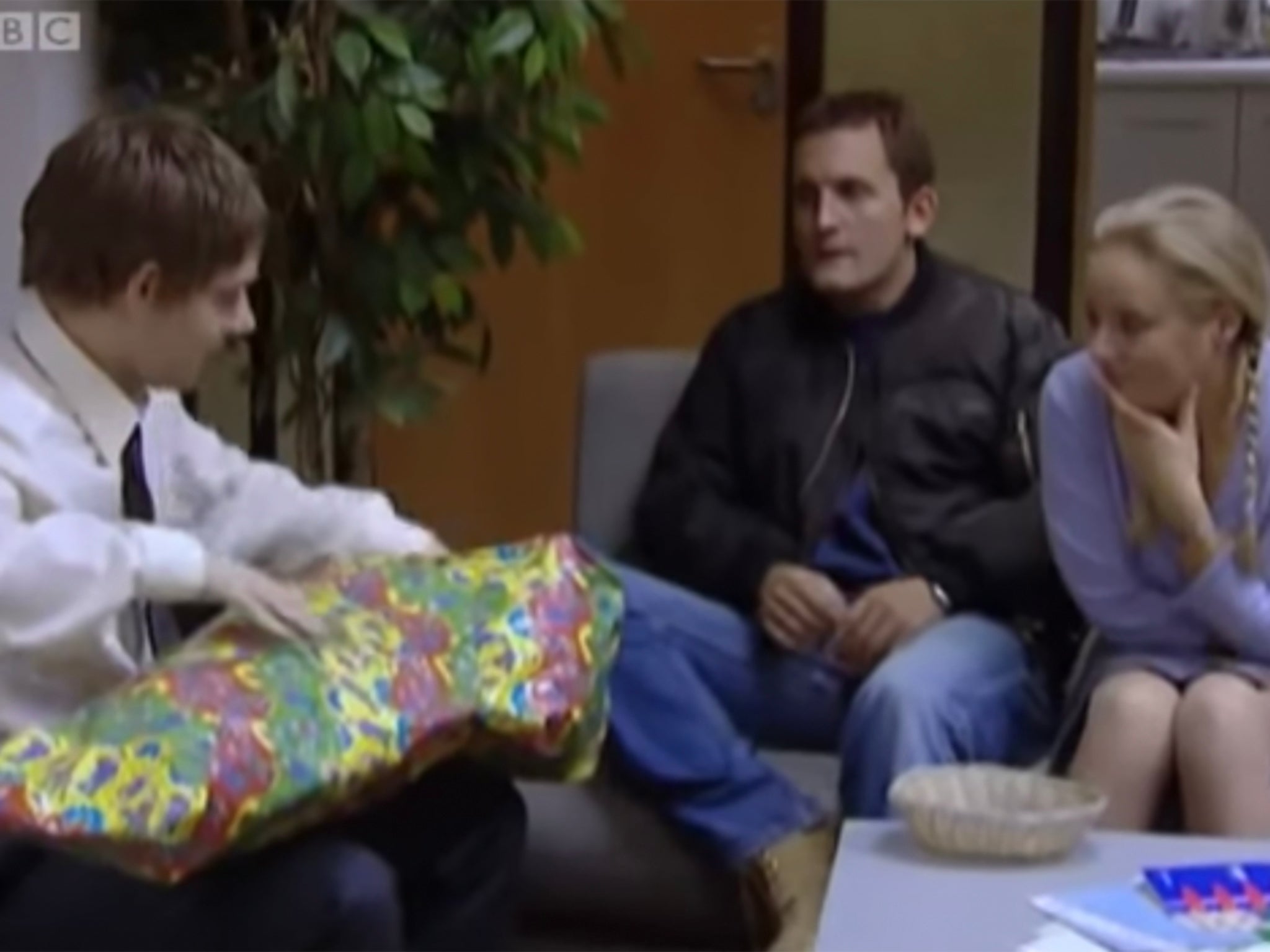
EM: A couple of times, it was impossible. During the questionnaire sequence, Ricky was mucking about so much, drawing little obscene pictures on his notebook and little faces on his thumb and doing whatever he could to put me off. You can see in the outtakes that he’s up to no good.
SM: Ricky had a tendency to make the other actors laugh. It became a mission for him to try and make Martin break. I was just anxious about the time because we had other scenes to shoot and I’d often get frustrated with him. It’s only when I started acting with him in Extras that I understood that impulse. There is something fun about trying to make other actors laugh. It’s partly about creating a fun atmosphere but also just reassuring yourself you’re being funny – because you’re working in a vacuum when you’re filming.
EM: It’s a nervous reaction – because if you were laughing because it’s funny, after the first couple of times, it isn’t funny really. It’s hard to explain because you get absolutely angry at yourself for doing it, but you can’t stop. I’ve been pretty good at not corpsing since, probably because I went through The Office. It was like the Vietnam War of corpsing – once you’ve been through that, you can cope with anything.
SM: There is a sort of hysteria that sets in when you start laughing and you can’t stop. It’s like the hiccups. The bloopers are much funnier to me now than they were at the time.
‘The Office’ premiered on 9 July 2001 to a lukewarm reception – but soon, audiences couldn’t get enough of the Brentmeister General…
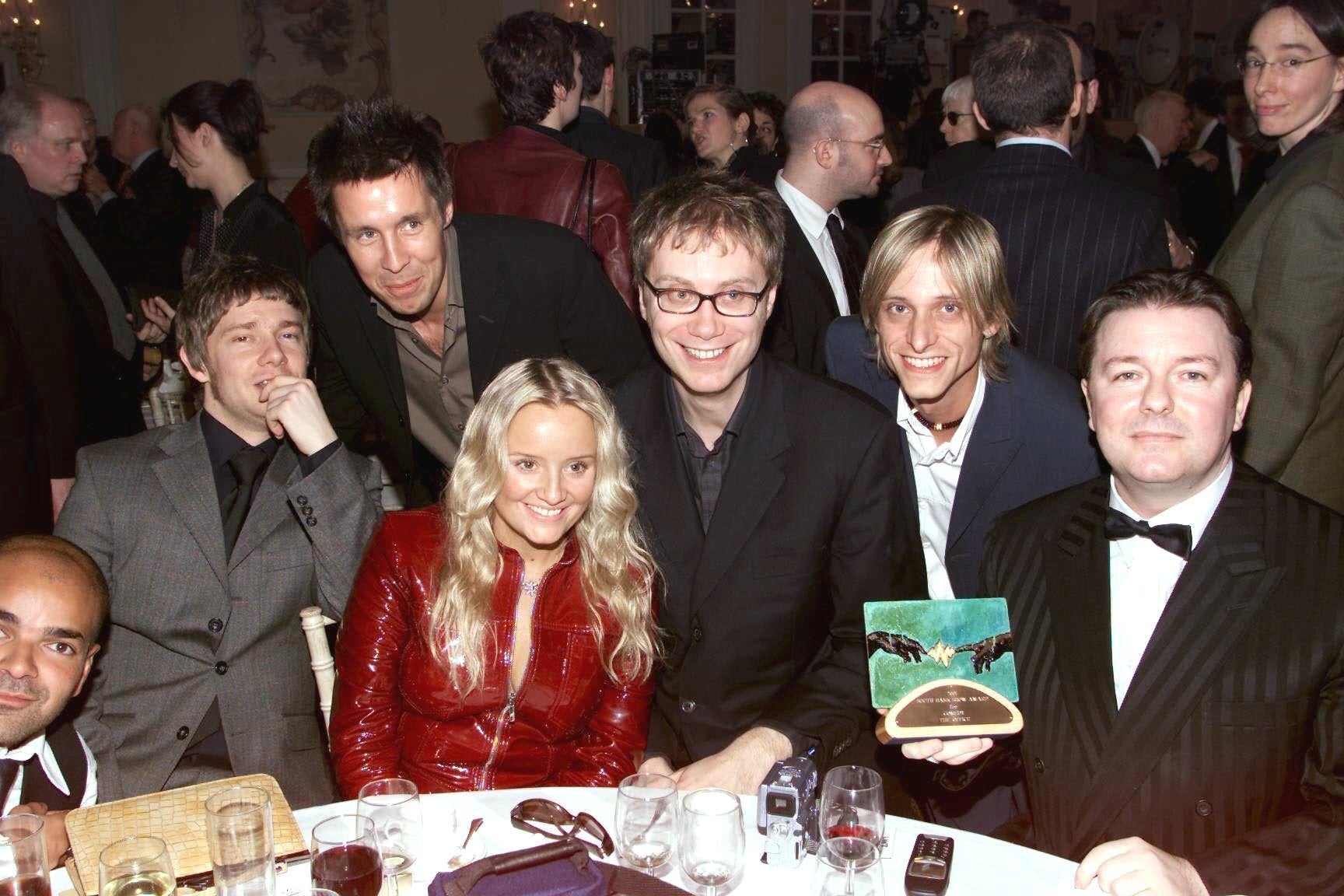
SM: No one had any high expectations for it and it tested very poorly. The only thing that tested lower was women’s bowls – I don’t know why women’s bowls particularly – but no one had any expectations about it. We were just left to our own devices.
SG: I thought that maybe it was a bit like a sixth form review, in that we all found it really funny and it was a great laugh to do – but actually when people watched it, would they think it was funny? So many people were like, “It’s just too uncomfortable” – then after episode four or something people finally went, “Oh, it’s a mockumentary” and peeled themselves off the ceiling.
EM: It didn’t get much attention when it first came out. It got an awful review in the Evening Standard and there wasn’t much of a buzz. Then for some reason when it got repeated a lot of people cottoned on to it. It was back in the days where if you missed a show on TV, that was it – there was no iPlayer or YouTube. When it got repeated, the people who did like it were fanatical about it and pointed others in the direction. It just snowballed from there.
No one had any high expectations for it – we were just left to our own devices
SM: It was a slow start and then it started to get some attention from various awards. It was repeated and then the DVD came out and just started selling. I remember the cast did a signing at HMV on Oxford Street and there was a really big turnout. We were all a bit surprised and I was like, “Wow, this is doing better than we expected.”
JB: I remember going back to do the read-through for series two. The read-through for series one was in some BBC basement room and we were all huddled around a table. For series two, we were in the BBC boardroom with catering. I was like, “OK, this has really landed…”
RI: A few years after the show, whenever you read scripts you’d hear things like “a bit like The Office” or “a bit like Brent”. I think The Office allowed there to be more introverted acting that can still be funny to watch. It sort of blew the doors open on those kinds of characters coming to the fore within comedy.
SM: I remember I’d be on the Tube and pick up the Evening Standard and there’d be an article about office life and it’d always be illustrated by a picture of Ricky or Tim and Dawn. Suddenly the show became this kind of go-to reference point for anything regarding offices. It was a very incremental thing and then at some point you look around and realise the show is a sort of cultural touchstone in a way you hadn’t quite realised.
JB: I think it’s a testament to the amount of DVDs it sold – it shows you how popular it was and how people have just rewatched it. I recently had some work done in my house and my builder asked me to sign his DVD of The Office, which he still watched.
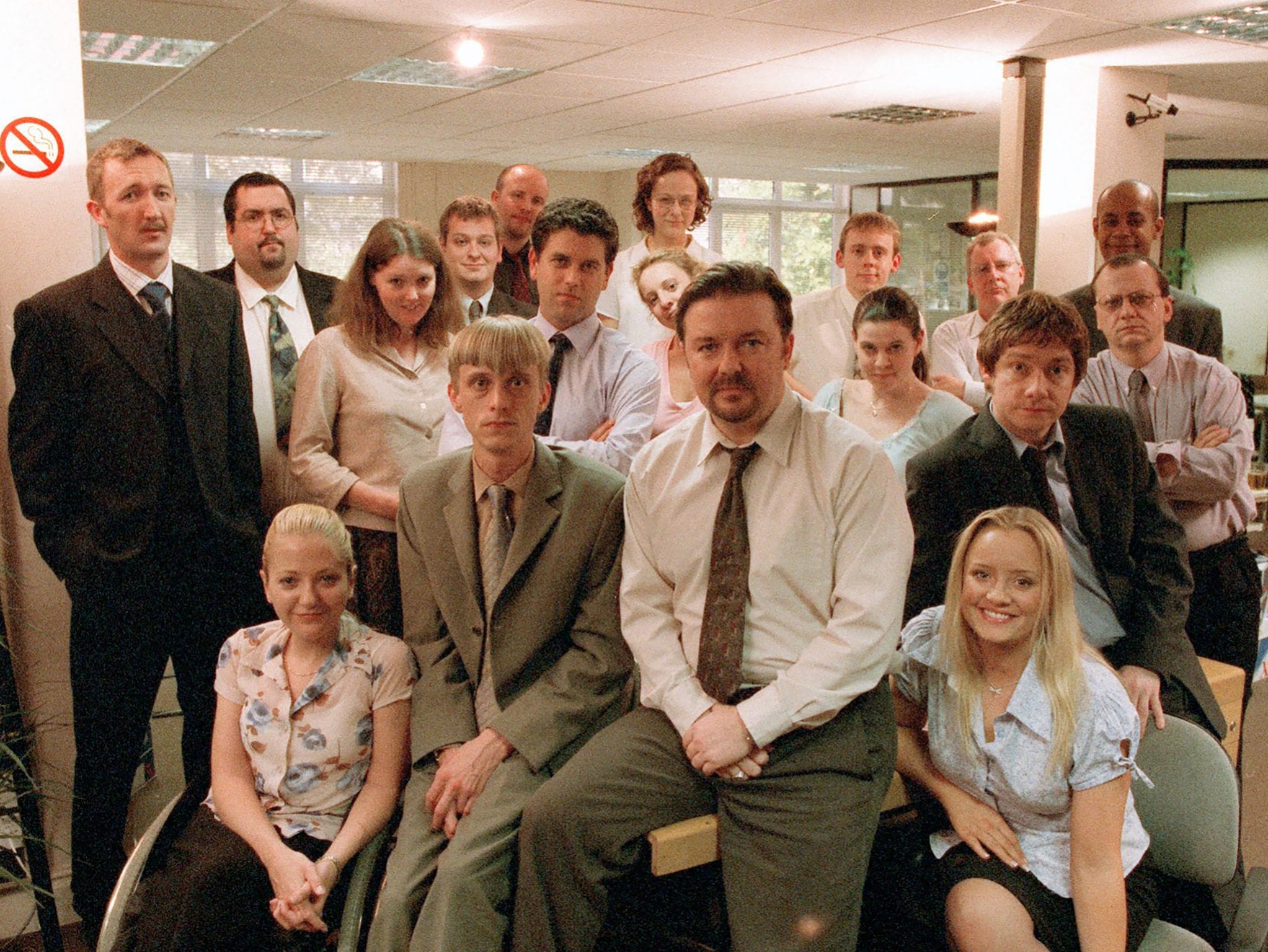
‘The Office’ ended with a two-part Christmas special that struck the perfect balance of hilarity and sentimentality, the impact of which can still be felt two decades later…
SM: I remember we just felt a bit exhausted and like we were running out of steam. We were worried the show was going to get a bit too sitcom-y and we were going to end up repeating ourselves and David Brent was going to keep on doing more and more stupid things – that’s why we felt we should end it. We’d always imagined it’d have a happy ending. We knew where we were heading, we knew the characters and we were all working so well by that point. We had a certain confidence that we could do it well. I’m very proud of the Christmas specials because I do think they pay off really nicely and they’re very touching. There’s a sweetness and a romance to them that’s really heartwarming.
EM: I started doing The Office pub quizzes a few years ago and I was mobbed by people who knew the show off by heart all these years later. I had an ex-international cricketer tell me that he believed the show had saved his life when his wife left him and he was an alcoholic and thinking of ending it. He said he watched The Office every day and he reckoned it’s what saved his life. I’ve had a couple of people say similar things like that. These characters almost become people’s mates and just having it on provides comfort.
SG: I’m amazed and thrilled at how much it has affected everybody. When you see that reflected when people know you’ve been in it, it’s really nice. You get a bit of extra impressed-ness from people because you’ve been in it too, which always makes me giggle. When people’s faces light up, that always makes me really happy.
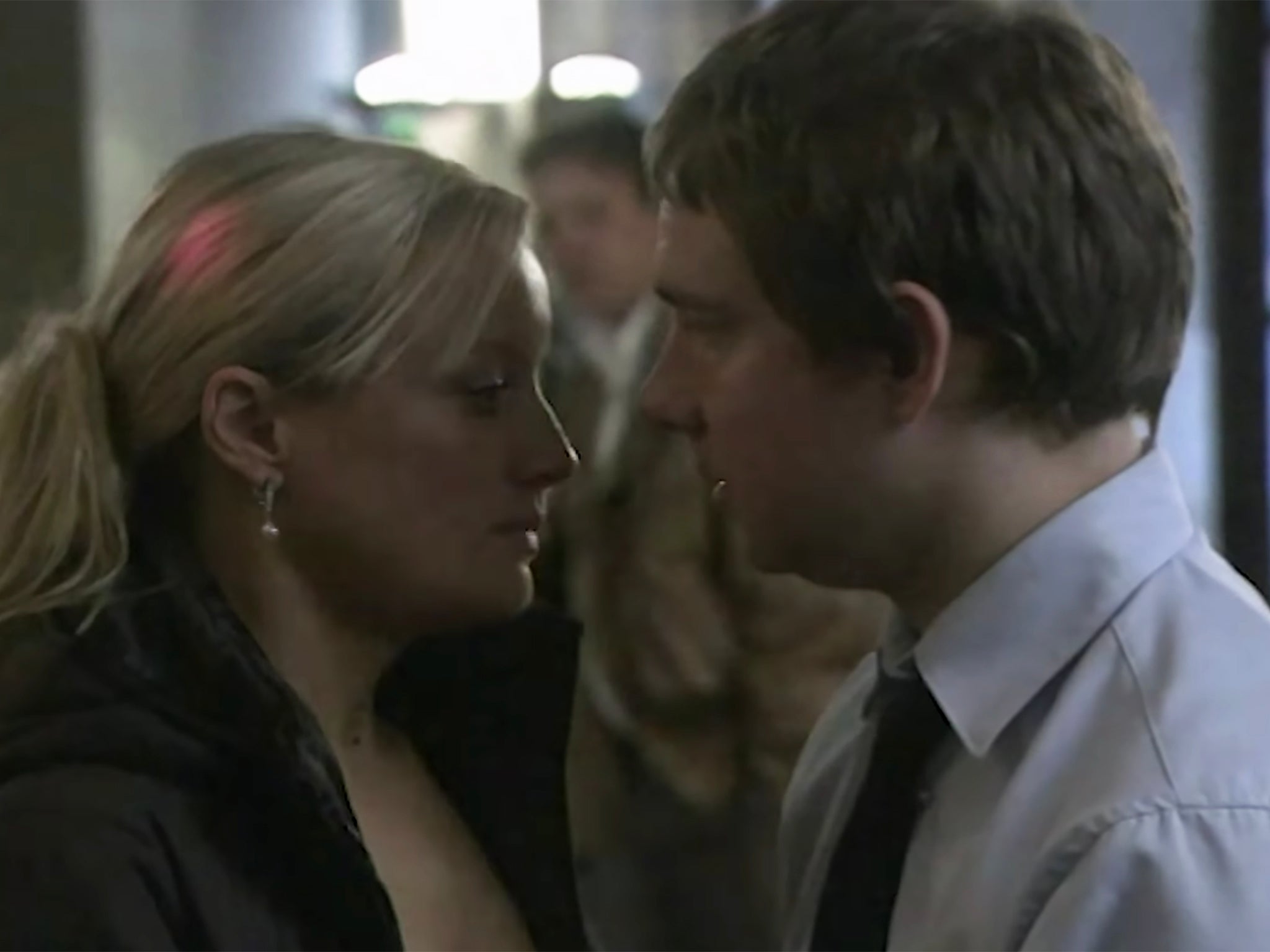
SM: Years later, I was walking down the street and this woman who worked for the ambulance service came up to me and said, “Ambulance drivers are some of the toughest, hardest people you can imagine, yet we watched The Office Christmas specials together and we were all in tears.” That was so pleasing to me. It’s so hard to give people an emotional reaction to something – whether it’s laughter or tears – and to know we’ve done that, that’s why I’m very proud of that special.
JB: It’s one of those shows where you always hear people say, “You’ll feel better about the world if you just sit down and watch it.” It’s real but it’s not real. It has the highs and lows and ups and downs of real life but it’s done in a way that you can almost take a step back and laugh at the world a little bit and not take it too seriously.
RI: We were all early on in our careers and lives. It’s quite nice to bump into people from The Office and see where they’ve gone since. It’s like when you bump into friends from junior school. If you bump into anyone from The Office, there’s this nice, warm, cosy feeling. I’m proud to have been a small part of this new world of TV.
SM: My ambition was always to create a sitcom that was taken to people’s heart as much as the shows I loved were taken to my heart. I was such a nerd for sitcoms. I was the person that would video them, transcribe them and read the script books, so to have done something that affected people in a similar way was giddying for me. It was just this little team of us announcing ourselves to the world and there’s a great nostalgia for that because it’s impossible to recreate.



Join our commenting forum
Join thought-provoking conversations, follow other Independent readers and see their replies
Comments